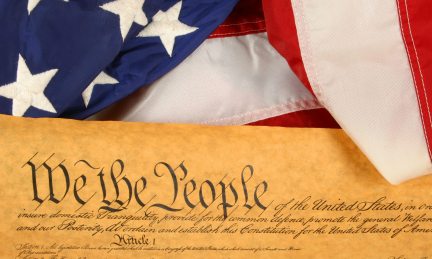Freedom Survey


Answering Question # 11
11. The phrase, “You cannot legislate morality” is a common cliche'. Is it true of false?
a True
b False
In answering the previous question, we can see that church and state are two separate institutions, but the influence of the church was never intended to be separate from government. Yet those who want to keep the influence of the church out of government often use the cliche', “You cannot legislate morality.”
However, there is an element of truth in the cliche'. Laws cannot make a person internally moral. Laws cannot change what people believe, make people good or change the human heart. Those who say, “You cannot legislate morality,” are usually expressing a concern that religious values in government could become coercive, ultimately forcing religion upon the citizens. But by its very nature, true Christianity does not and cannot coerce or force people to become Christians. True Christianity is a matter of the heart, between Christ and the individual.
But maintaining order in society, where everyone does not have that inward morality, requires certain laws to be written and enforced that are moral in nature.
Morality is a concept that applies beyond an individual’s inner character. In the original 1828 Dictionary of the English Language, Webster defined morality as:
The doctrine or system of moral duties, or the duties of men in their social character; ethics.
The practice of the moral duties.
The quality of an action which renders it good; the conformity of an act to the divine law.
We can see that morality applies to one’s actions or practice of social character and duty, not just the inner person. Therefore, laws against murder that protect life are moral laws. It is the moral and ethical duty of all people to protect life. Laws against theft that protect personal property are moral laws. Laws that prohibit adults from sexually abusing minors are moral laws. It is precisely because of people’s tendency to be immoral that government must make laws that are designed to restrain immorality. Therefore, we must conclude that the statement in question is “False.”
But can this concept go too far? How far can Christian values be imposed? Where does one draw the line?
It seems the founders wrestled with this as well and gave us the Fourth Amendment. They essentially drew the line at privacy. One may choose immoral behavior in his private life if he chooses. Keeping bad behavior private does not make it right, but government has no jurisdiction there. However, when immoral behavior affects other people and becomes destructive to society at large, it becomes a civil issue and government must address it. The purpose of good civil government, according to Romans 13:3-4, is to praise good behavior and punish bad behavior.
The founders fully welcomed and expected Christianity to influence our government. But they also understood that, whether in church or state, centralized power has a tendency to grow corrupt. That is why the founders put the establishment of religion clause in the First Amendment, to prevent any one branch of Christianity from having too much power. Though individual branches of Christianity may grow corrupt, Christianity in general will not. Just as they separated the powers of government into three branches, they also wanted to spread the Christian influence upon government among the many denominations of the church. They accomplished this by restricting Congress from respecting any one establishment of religion above another, and by providing that the free exercise of religion would not be prohibited.
When it comes to religious values in civil government, neutrality is a myth. There is no vacuum; someone’s values will influence the laws made. The religion where man is god (secular humanism or atheism) has given us the cruel dictatorships of communism. Islam has also given us brutally oppressive forms of civil government under shariah law. And under the banner of Christianity, corrupt centralized religion has reared its ugly head at times throughout history, producing severe persecution for any who dared to disagree with the state church. But government influenced by the values and principles taught by Jesus Christ, guarded by the decentralizing wisdom in the First Amendment, produced the freest nation the world has ever known. So we are left with the question:
“If Christian values do not influence our laws, then whose values will?”
Surrendering one’s life to Christ as personal Savior is an important issue. I encourage all to do so for the forgiveness of sins and for the sake of eternal life in the age to come.
But in this present age, there are benefits as well. Ultimately, those who are governed internally by the law of God written in their hearts are those who need little external controls in the form of civil government. This concept is the source of freedom. So whether we embrace Christ as personal Savior or not, may we all embrace Christian values in civil government as the source and foundation of liberty.
-----
Answers Index What Now?
---
Subscribe to our email list for results from the Feedom Quiz survey and other educational information.
The Knowledge Is Power Project is brought to you by Purpose Ministries
(c) copyright 2014, Brad Sherman
Answers Index What Now?
---
Subscribe to our email list for results from the Feedom Quiz survey and other educational information.
The Knowledge Is Power Project is brought to you by Purpose Ministries
(c) copyright 2014, Brad Sherman